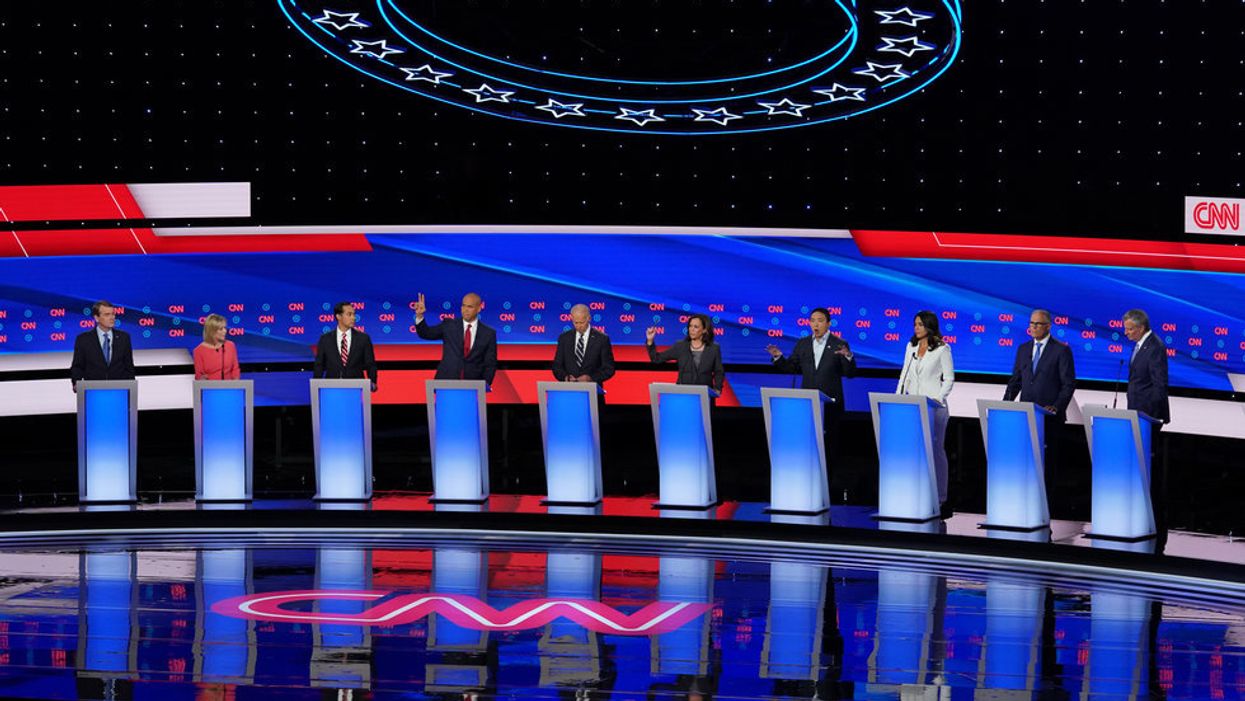Marcum is a governance fellow at R Street Institute, a nonpartisan, pro-free-market, public policy research organization.
July's Democratic presidential debates highlighted a number of important national issues. From health care to economic inequality, candidates offered many purported solutions. The vast majority of these ambitious plans, however, face a fundamental constitutional roadblock: Congress.
Without congressional support, plans such as Medicare for All or amending the Immigration Nationality Act are dead on arrival. Voters, candidates and media alike are well aware that Senate Majority Leader Mitch McConnell would prevent any such legislation from passing his chamber, and if Republicans take the House, the chances for passage are even slimmer.
But if you were completely unfamiliar with American civics, you might have assumed from watching the debates that a president's role is to make policy and lambaste Congress when it does not comply. But of course, all legislative power rests with Congress. Viewers of the debates would be better served by questions that illuminate the presidency's actual institutional roles. These responsibilities are vital for governing, but we often fail to press candidates about them until it is too late.
The president is the commander in chief and has the responsibility to "take care that the laws be faithfully executed." The president also possesses the power to nominate federal judges and high-level federal officials who oversee the workings of an ever-expanding executive branch.
Legal scholars and government lawyers often discuss the "inherent powers" of the presidency, which include the power to issue executive orders. We should want to know how, as president, the Democratic candidates would wield this power. Last month, for instance, Sen. Kamala Harris tweeted that, as president, she would "give Congress 100 days to put a gun safety bill on [my] desk for signature." If Congress failed to do so, she would "take executive action." What sort of executive action would she take? Does she believe, as president, she could impose an executive order as broad or as wide-reaching as any law imposed by Congress?
Such executive orders would certainly face legal challenges. The Trump administration's own regulatory decision to ban bump stocks was quickly challenged and continues to be litigated in federal court. Would Democratic candidates implement a similar regulatory strategy? Presidents appoint numerous senior officials to the Department of Justice. If the bump stocks case remains unresolved under a Democratic administration, would these new senior legal officials continue the charge? The Trump administration has been routinely criticized for its eagerness to reverse legal arguments raised during the Obama administration. Would a Joe Biden administration just as quickly return to Obama-era positions?
Beyond inherent powers, candidates have spent little time discussing roles specifically tasked to presidents by the Constitution. Consider the president's power to nominate high-level federal officials and judges. Who would Sen. Elizabeth Warren nominate to lead the Department of Health and Human Services if she becomes president? Who would Sen. Bernie Sanders tap to run the Department of the Treasury if he does? Criminal justice reform has been a hallmark of Sen. Cory Booker's platform. Would he pledge to name an attorney general who has experience as a public defender or serving nonprofit legal clinics?
As the third branch of government, the judiciary often gets third-rate consideration on the campaign trial. That was different in 2016, and now President Trump and Senate Republicans often cite the confirmation of dozens of federal judges as their greatest political achievement. But the only real discussion of the judiciary among Democratic candidates has concerned proposals to add seats or set term limits on the Supreme Court, even though the former holds bipartisan opposition and the latter would require amending the Constitution.
Federal judges serve for life and the ramifications of their decisions will last well beyond any one administration. But in the July debates, no Democratic candidates were asked about the judiciary. Yet over the same 48 hours, the Senate confirmed an additional 13 federal judges. Candidates should consider this disconnect. And in the next round of debates, they should tell us whether they have a draft list of qualified candidates for the Supreme Court, just as Trump did when he was the GOP nominee.
The presidency is a unique and powerful role. Yet too often, platforms and campaign promises sidestep the important constitutional responsibilities of the commander in chief. In addition to legislative priorities, candidates should answer how they intend to use the powers of the presidency. Doing so will be helpful for voters and perhaps cast a wider and more recognizable divide between the current presidential nominees.



















Trump & Hegseth gave Mark Kelly a huge 2028 gift